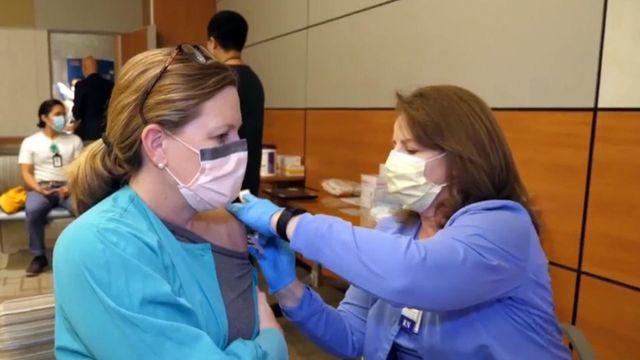DHHS, hospitals point fingers over delays in vaccinating NC health care workers
Problems at the state level are delaying coronavirus vaccinations for some area health care workers, according to hospitals.
Posted — UpdatedBut a spokeswoman for the state Department of Health and Human Services said Friday that some workers might not have completed required paperwork to be vaccinated.
The state's vaccination process requires hospitals to submit names of those getting shots so that officials can track who's been vaccinated and needs a second dose in North Carolina’s COVID-19 Vaccine Management System. The system then notifies the workers by email when they can be vaccinated.
UNC Health said Thursday that the state was struggling to upload the files of eligible workers submitted by dozens of hospitals into its database. All of the workers are in Phase 1A of the national vaccine distribution system – health care workers at highest risk of exposure to the virus.
"This delay is causing angst among our frontline workers who are eager to get vaccinated once they receive the state’s email," UNC Health said in a statement. "Our teams are working tirelessly to set up the infrastructure to vaccinate all of our 1A workers. ... It will take several weeks to reach all of our 1A co-workers."
UNC Health said 25 percent of the people who should’ve been vaccinated haven't yet gotten a shot because of the email glitch.
"Duke has experienced similar technical issues and is working with the state to resolve them," Duke Health officials said in a statement Friday.
DHHS "knows of no issue delaying vaccinations," spokeswoman Kelly Haight Connor said in an email.
Connor said providers create employee profiles in the vaccine management system, but employees must then enter additional information to complete the process.
"If someone is having any issues, they should work with their hospital/employer to confirm their name was listed and the correct contact information was filed," she said.
"Because of the limited supply of vaccine, it will take several weeks or more to vaccinate everyone in group 1A," Connor said in a follow-up email.
UNC Health issued another statement Friday evening that "a high percentage" of eligible workers had received the required email from the state and were ready to be scheduled for vaccination.
"It’s pretty remarkable to have this done in a relatively short period of time from Tuesday until today," the statement said. "The vaccination process is very complicated for UNC Health, all our partner health systems and the State. Each of us is working through our growing pains, but we have rolled out vaccines successfully and continue to improve the process in partnership with the state."
More than 1,000 UNC Health workers had been vaccinated by Friday evening, and another 1,000 were set to receive shots over the weekend, a spokesman said.
WakeMed began vaccinating its employees Friday after getting its first shipment of Pfizer's vaccine on Thursday. Officials there said they haven't experienced any problems with delays.
"I think this is one of the most wonderful holiday gifts we could imagine," said Dr. David Kirk, a pulmonary and critical care specialist and associate medical director at WakeMed, who got his first dose of vaccine. "It’s wonderful. It’s emotional."
Deborah Washington, a critical care nurse in WakeMed’s COVID-19 ICU, also was among the first to be vaccinated.
"It's just not one of those things that it is readily acceptable now, in my community, in the African-American community. So, if I can get it first and document my progress, then that's the most important thing for me," Washington said.
"The vaccine will help us reopen our businesses. The vaccine will help us open restaurants. Do not be scared," Kirk said.
Related Topics
• Credits
Copyright 2024 by Capitol Broadcasting Company. All rights reserved. This material may not be published, broadcast, rewritten or redistributed.






